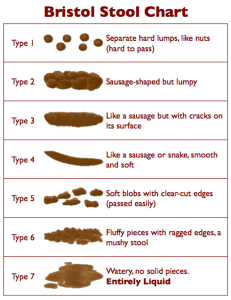Let’s just start by saying we all poop. For some people this is a topic that’s difficult to discuss with family, friends or even their physician in San Antonio, TX. For others, like my grandpa or my 6 year old boy, they could talk about it all day. However, a bowel movement can be an indicator of your overall digestive health. I’m going to walk you through the basics of a “normal” bowel movement and give you the perspective of a gastroenterologist on the key indicators to look for and what they could mean.
BOWEL MOVEMENTS
 A poop – or referred to as a “bowel movement”- is defined as the passage of undigested food, bacteria and waste through your gastrointestinal tract and out the rectum. This is an essential body function. There are many reasons why this process can change but mild day to day fluctuations are normal and based on things like diet, fluid intake and activity level. What your overall average stool looks like is where we get the most information. There is even a chart to use, called the Bristol Stool Scale named after the University of Bristol where it was first described. Type 1 and 2 tend towards constipation. Type 3 and 4 are “normal”. Type 5, 6 and 7 tend towards diarrhea. The chart looks like this:
A poop – or referred to as a “bowel movement”- is defined as the passage of undigested food, bacteria and waste through your gastrointestinal tract and out the rectum. This is an essential body function. There are many reasons why this process can change but mild day to day fluctuations are normal and based on things like diet, fluid intake and activity level. What your overall average stool looks like is where we get the most information. There is even a chart to use, called the Bristol Stool Scale named after the University of Bristol where it was first described. Type 1 and 2 tend towards constipation. Type 3 and 4 are “normal”. Type 5, 6 and 7 tend towards diarrhea. The chart looks like this:
BOWEL MOVEMENTS – WHAT SHOULD I BE AWARE OF?
Most of us do not spend a great deal of time thinking about our bowel movement. For others with intestinal disorders their bowel movements are constantly on their minds. It’s no surprise that many people do not know exactly what a “normal” one is. The fact is that there is no one definition of a normal bowel movement. The once a day after breakfast soft sausage shaped stool that people strive for usually just happens in the movies. In real life there is an entire spectrum of what would be considered normal, and each person’s regularity is going to be highly individualized.
There are, however, four primary characteristics of a bowel movement that when abnormal should be discussed with your physician or gastroenterologist in San Antonio, TX.
- Frequency – A normal frequency of bowel movement ranges from 3 times a day to once every 3 days. So I tell me patients as long as they are having a movement a couple times a week to a couple times a day we are ok. You don’t need to strive for a daily bowel movement, some peoples systems just aren’t built that way. What your physician will want to know about with regards to frequency is any significant change. If you’re normally a 3 a day’er and now you’re only going every other day that’s a significant change we would want to know about.
- Color – The majority of a stools color comes from a combination of the bile/ intestinal secretions and bacteria in our bowels. Usually this make a light to dark brown stool. If having diarrhea the bile can go through quickly and give us a yellow color. This can even make it look green at times. If it’s ever red, maroon or black this could be indication of internal bleeding and this is something you would want to notify your physician about right away. If it’s ever blue, talk to your parents, you may not be from here.
- Shape – Using the Bristol Stool Scale as a guide you can describe your stool to your physician. Type 1 and 2 usually indicate poor fiber and fluid intake (put link to my section on constipation here). It may also indicate what we call idiopathic chronic constipation and may be a problem with slow motility of your colon. Type 3 and 4 as mentioned about are what we are looking for. Type 5, 6 and 7 can happen for a variety of reasons and the work up will depend on how recently the change has occurred and your medical history. Again, if you normally have one type of stool and it changes, that is a reason to contact your physician.
- Odor – Don’t fool yourself, every bodies stool stinks. The odor is mostly due to fermentation of the food products by the bacteria in our bowels. Some foods make a very strong odor and others are much milder. A change in odor every now and then or when you eat something new is not that unusual. However, a very fowl smelling stool that lasts awhile can be indicative of an intestinal infection or even blood and this would be a reason to notify your physician.
BOWEL MOVEMENT PROBLEMS
The five main problems associated with your bowel movements you should notify your physician about are as follows:
- Blood in the Stool – Blood is never normal and indicates something wrong on the inside. Could be something as simple as hemorrhoids (put link to my hemorrhoid section here) or as dangerous as colon cancer. Always notify your physician if blood is seen and get this checked out. Don’t let it turn into something we don’t want it to be.
- Constipation – Chronic constipation is a very common problem and a very treatable one. Through discussion, diet and life style changes, fiber, fluids and medications we have available it is something you should not have to suffer with. See you physician if constipation is your problem (link to constipation section here).
- Diarrhea – Acute diarrhea can be an infection or due to something you ate. Most will blow through in a few days on their own and some stick around and require medication. Chronic diarrhea can be caused by things like irritable bowel syndrome (IBS), inflammatory bowel disease (IBD), diet intolerances, medications and infections. It’s a long list. Chronic diarrhea is usually always treatable as well so don’t just deal with, have it evaluated and see what we can do.
- Bowel Incontinence – Leakage of stool is never a fun thing. It most commonly happens from prior trauma to the anal sphincter (like while delivering a baby), can be caused by an anal fissure (split or tear in the anal canal), some neurologic problems or it may just be from hemorrhoids. There are new treatments for bowel incontinence so if you suffer from this see your gastroenterologist and see what we have to offer.
BOWEL MOVEMENTS AND YOUR DIGESTIVE HEALTH
How your bowels move say a lot about what could be going on inside. As discussed above, even though I don’t want you to focus on your bowels on a daily basis, be aware of changes from your norm as these may be indicators of something going on. Thorough and symptom appropriate evaluation by your physician or gastroenterologist with studies like blood work, stool studies and colonoscopy will usually always get to the bottom of your problem. Listen to your body and evaluate the changes. They may indicators of something more going on. A good bowel movement is important, and like my grandpa once told me “everybody poops, just not too many people do it as well as I do.”





